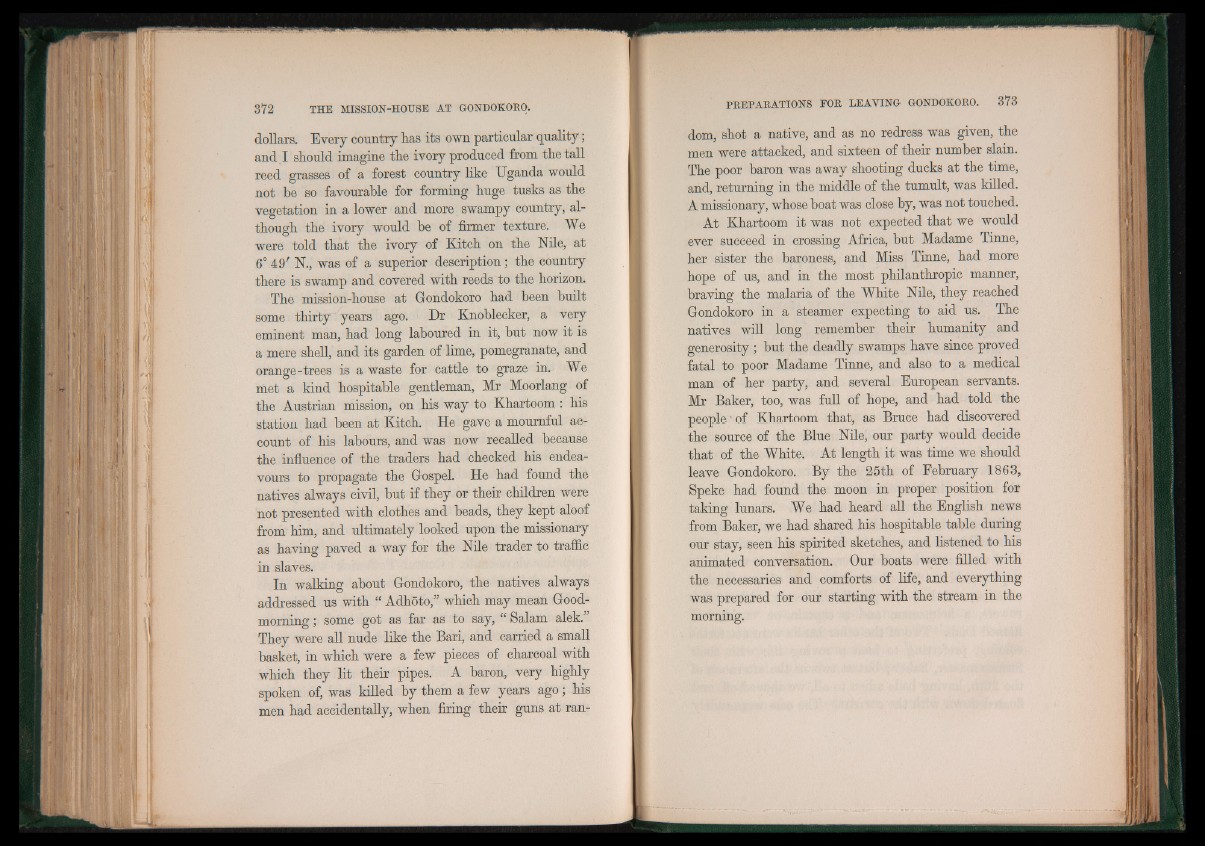
dollars. Every country has its own particular quality;
and . I should imagine the ivory produced from the tall
reed grasses of a forest country like Uganda would
not be so favourable for forming huge tusks as the
vegetation in a lower and more swampy country, although
the ivory would be of firmer texture. We
were told that the ivory of Kitch on the Nile, at
6° 49' N., was of a superior description; the country
there is swamp and covered with reeds to the horizon.
The mission-house at Gondokoro had been built
some thirty years ago. Dr Knobleeker, a very
eminent man, had long laboured in it, but now it is
a mere shell, and its garden of lime, pomegranate, and
orange-trees is a waste for cattle to graze in. We
met a kind hospitable gentleman, Mr Moorlang of
the Austrian mission, on his way to Khartoom : his
station had been at Kitch. He gave a mournful account
of his labours, and was now recalled because
the influence of the traders had checked his endeavours
to propagate the Gospel. He had found the
natives always civil, but if they or their children were
not presented with clothes and beads, they kept aloof
from him, and ultimately looked upon the missionary
as having paved a way for the Nile trader to traffic
in slaves.
In walking about Gondokoro, the natives always
addressed us with “ Adhoto,” which may mean Good-
morning ; some got as far as to say, “ Salam alek.
They were all nude like the Bari, and carried a small
basket, in which were a few pieces of charcoal with
which they lit their pipes. A baron, very highly
spoken of, was killed by them a few years ago; his
men had accidentally, when firing their guns at random,
shot a native, and as no redress was given, the
men were attacked, and sixteen of their number slain.
The poor baron was away shooting ducks at the time,
and, returning in the middle of the tumult, was killed.
A missionary, whose boat was close by, was not touched.
At Khartoom it was not expected that we would
ever succeed in crossing Africa, but Madame Tinne,
her sister the baroness, and Miss Tinne, had more
hope of us, and in the most philanthropic manner,
braving the malaria of the White Nile, they reached
Gondokoro in a steamer expecting to aid us. The
natives will long remember their humanity and
generosity ; but the deadly swamps have since proved
fatal to poor Madame Tinne, and also to a medical
mam of her party, and several European servants.
Mr Baker, too, was full of hope, and had told the
people 1 of Khartoom that, as Bruce had discovered
the source of the Blue Nile, our party would decide
that of the White. At length it was time we should
leave Gondokoro. By the 25th of February 1863,
Speke had found the moon in proper position for
taking lunars. We had heard all the English news
from Baker, we had shared his hospitable table during
our stay, seen his spirited sketches, and listened to his
animated conversation. Our boats were filled with
the necessaries and comforts of life, and everything
was prepared for our starting with the stream in the
morning.